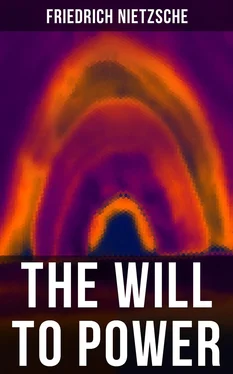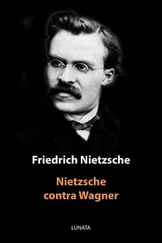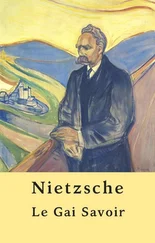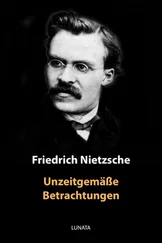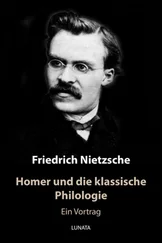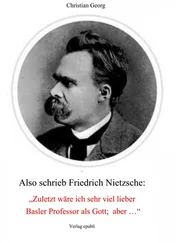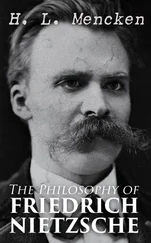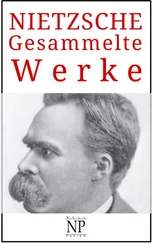78.
Modern Mummery
The motleyness of modern men and its charm Essentially a mask and a sign of boredom.
The journalist.
The political man (in the "national swindle").
Mummery in the arts:—
The lack of honesty in preparing and schooling oneself for them (Fromentin);
The Romanticists (their lack of philosophy and science and their excess in literature);
The novelists (Walter Scott, but also the monsters of the Nibelung, with their inordinately nervous music);
The lyricists.
"Scientifically."
Virtuosos (Jews).
The popular ideals are overcome, but not yet in the presence of the people :
The saint, the sage, the prophet.
79.
The want of discipline in the modern spirit concealed beneath all kinds of moral finery.—The show-words are: Toleration (for the "incapacity of saying yes or no"); la largeur de sympathie (= a third of indifference, a third of curiosity, and a third of morbid susceptibility); "objectivity" (the lack of personality and of will, and the inability to "love"); "freedom" in regard to the rule (Romanticism); "truth" as opposed to falsehood and lying (Naturalism); the "scientific spirit" (the "human document": or, in plain English, the serial story which means "addition"—instead of "composition"); "passion" in the place of disorder and intemperance; "depth" in the place of confusion and the pell-mell of symbols.
80.
Concerning the criticism of big words. —I am full of mistrust and malice towards what is called "ideal": this is my Pessimism, that I have recognised to what extent "sublime sentiments" are a source of evil—that is to say, a belittling and depreciating of man.
Every time "progress" is expected to result from an ideal, disappointment invariably follows; the triumph of an ideal has always been a retrograde movement .
Christianity, revolution, the abolition of slavery, equal rights, philanthropy, love of peace, justice, truth: all these big words are only valuable in a struggle, as banners: not as realities, but as show-words, for something quite different (yea, even quite opposed to what they mean!).
81.
The kind of man is known who has fallen in love with the sentence " tout comprendre à est tout pardonner" It is the weak and, above all, the disillusioned: if there is something to pardon in everything, there is also something to contemn! It is the philosophy of disappointment, which here swathes itself so humanly in pity, and gazes out so sweetly.
They are Romanticists, whose faith has gone to pot: now they at least wish to look on and see how everything vanishes and fades. They call it l'art pour l'art, "objectivity," etc.
82.
The main symptoms of Pessimism :—Dinners at Magny's; Russian Pessimism (Tolstoy, Dostoiewsky); æsthetic Pessimism, l'art pour l'art, "description" (the romantic and the anti-romantic Pessimism); Pessimism in the theory of knowledge (Schopenhauer: phenomenalism); anarchical Pessimism; the "religion of pity," Buddhistic preparation; the Pessimism of culture (exoticness, cosmopolitanism); moral Pessimism, myself.
83.
" Without the Christian Faith " said Pascal, "you would yourselves be like nature and history, un monstre et un chaos. " We fulfilled this prophecy: once the weak and optimistic eighteenth century had embellished and rationalised man.
Schopenhauer and Pascal. —I none essential point, Schopenhauer is the first who takes up Pascal's movement again: un monstre et un chaos, consequently something that must be negatived ... history, nature, and man himself!
" Our inability to know the truth is the result of our corruption, of our moral decay " says Pascal. And Schopenhauer says essentially the same. "The more profound the corruption of reason is, the more necessary is the doctrine of salvation"—or, putting it into Schopenhauerian phraseology, negation.
84.
Schopenhauer as an epigone (state of affairs before the Revolution):—Pity, sensuality, art, weakness of will, Catholicism of the most intellectual desires—that is, at bottom, the good old eighteenth century.
Schopenhauer's fundamental misunderstanding of the will (just as though passion, instinct, and desire were the essential factors of will) is typical: the depreciation of the will to the extent of mistaking it altogether. Likewise the hatred of willing: the attempt at seeing something superior—yea, even superiority itself, and that which really matters, in non-willing, in the "subject-being without aim or intention." Great symptom of fatigue or of the weakness of will : for this, in reality, is what treats the passions as master, and directs them as to the way and to the measure....
85.
The undignified attempt has been made to regard Wagner and Schopenhauer as types of the mentally unsound: an infinitely more essential understanding of the matter would have been gained if the exact decadent type which each of them represents had been scientifically and accurately defined.
86.
In my opinion, Henrik Ibsen has become very German. With all his robust idealism and "Will to Truth," he never dared to ring himself free from moral-illusionism which says "freedom," and will not admit, even to itself, what freedom is: the second stage in the metamorphosis of the "Will to Power" in him who lacks it. In the first stage, one demands justice at the hands of those who have power. In the second, one speaks of "freedom," that is to say, one wishes to "shake oneself free" from those who have power. In the third stage, one speaks of "equal rights"—that is to say, so long as one is not a predominant personality one wishes to prevent one's competitors from growing in power.
87.
The Decline of Protestantism : theoretically and historically understood as a half-measure. Undeniable predominance of Catholicism to-day: Protestant feeling is so dead that the strongest anti-Protestant movements (Wagner's Parsifal, for instance) are no longer regarded as such. The whole of the more elevated intellectuality in France is Catholic in instinct; Bismarck recognised that there was no longer any such thing as Protestantism.
88.
Protestantism, that spiritually unclean and tiresome form of decadence, in which Christianity has known how to survive in the mediocre North, is something incomplete and complexly valuable for knowledge, in so far as it was able to bring experiences of different kinds and origins into the same heads.
89.
What has the German spirit not made out of Christianity! And, to refer to Protestantism again, how much beer is there not still in Protestant Christianity! Can a crasser, more indolent, and more lounging form of Christian belief be imagined, than that of the average German Protestant?... It is indeed a very humble Christianity. I call it the Homœopathy of Christianity! I am reminded that, to-day, there also exists a less humble sort of Protestantism; it is taught by royal chaplains and anti-Semitic speculators: but nobody has ever maintained that any "spirit" "hovers" over these waters. It is merely a less respectable form of Christian faith, not by any means a more comprehensible one.
90.
Progress. —Let us be on our guard lest we deceive ourselves! Time flies forward apace,—we would fain believe that everything flies forward with it,—that evolution is an advancing development.... That is the appearance of things which deceives the most circumspect. But the nineteenth century shows no advance whatever on the sixteenth: and the German spirit of 1888 is an example of a backward movement when compared with that of 1788.... Mankind does not advance, it does not even exist. The aspect of the whole is much more like that of a huge experimenting workshop where some things in all ages succeed, while an incalculable number of things fail; where all order, logic, co-ordination, and responsibility is lacking. How dare we blink the fact that the rise of Christianity is a decadent movement?—that the German Reformation was a recrudescence of Christian barbarism?—that the Revolution destroyed the instinct for an organisation of society on a large scale?... Man is not an example of progress as compared with animals: the tender son of culture is an abortion compared with the Arab or the Corsican; the Chinaman is a more successful type—that is to say, richer in sustaining power than the European.
Читать дальше
